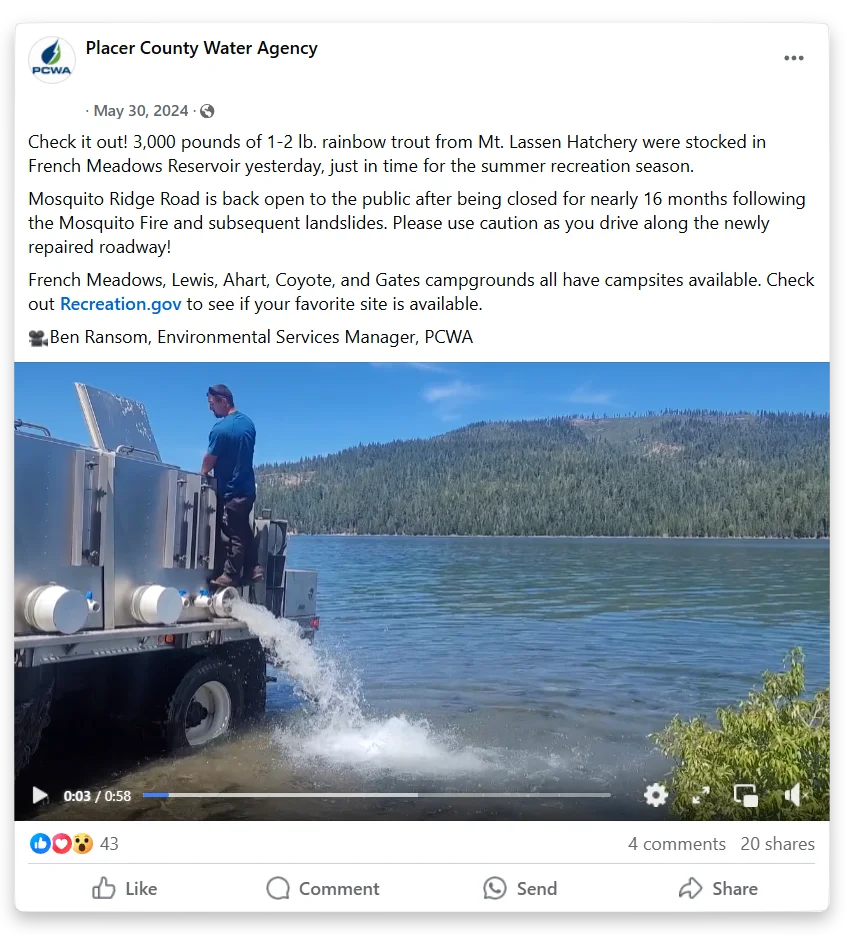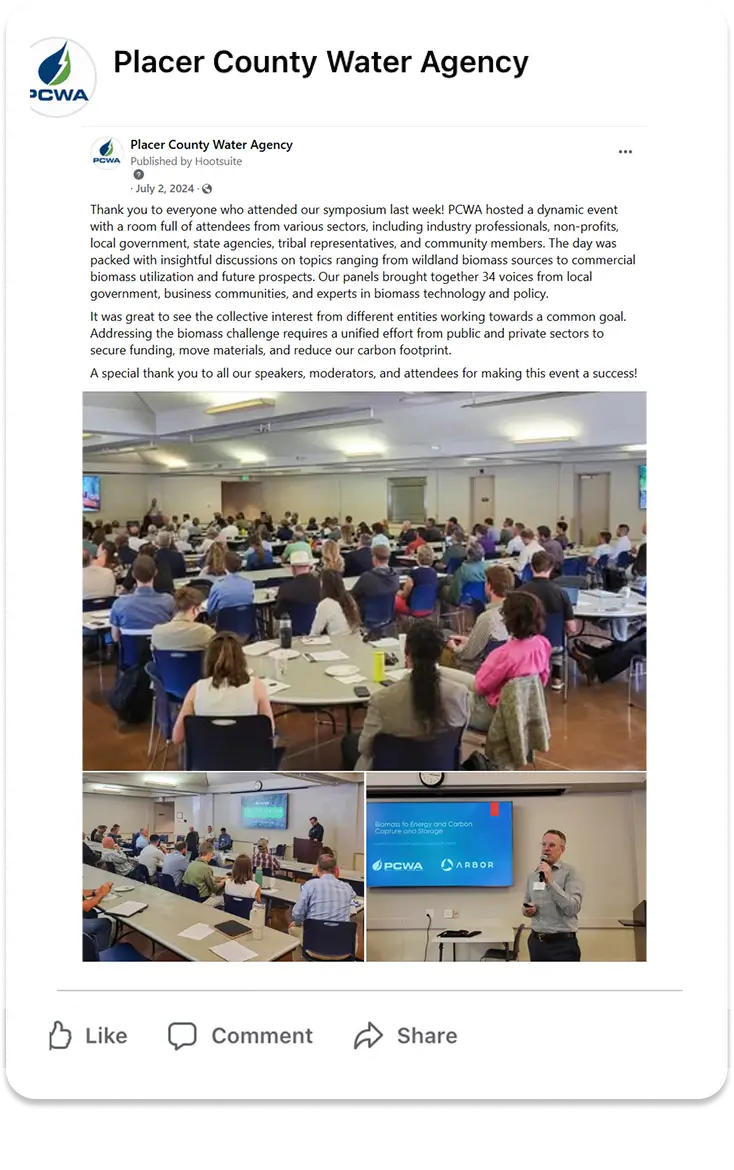
Annual Report
2024
STEWARDSHIP

The Placer County Water Agency (PCWA) is committed to stewardship by protecting natural resources and supporting community resilience. Through proactive forest management and fire prevention initiatives, PCWA helps safeguard water supplies and reduce wildfire risks and their aftereffects. PCWA fosters strong relationships with local agencies, supports local water system consolidations to improve service reliability, and champions sustainable practices to balance environmental health with community needs. This commitment ensures the long-term vitality of the area's water and natural resources.
Andy Fecko, ACWA 2024 Award

Excellence in Innovation
We're thrilled to announce that our General Manager, Andy Fecko, has been awarded ACWA's 2024 Excellence in Water Leadership Award! Andy's deep understanding of headwater issues and visionary purpose and dedication make him an invaluable leader in tackling innovative projects aimed at forest restoration, watershed health, and wildfire mitigation efforts.

Projects and Studies
The Moore Canal Fish Entrainment Study near Lincoln in western Placer County evaluated the potential for water diversions to affect sensitive fishery resources. The Moore Canal has long supported rice farming, migratory bird habitat, and open space preservation. However, diversions into the canal could result in harm to juvenile salmon and steelhead. PCWA is committed to protecting fish while maintaining reliable water for agriculture and this study has helped identify issues associated with diverting water from the Auburn Ravine. This project reflects PCWA’s dedication finding solutions that balance historical water uses with ecological improvements to sustain both the environment and the local agricultural community.
The Indian Bar Recreation Improvements Project enhances the popular river access site on the Middle Fork American River. Located just downstream of Ralston Afterbay and Dam, also known as Oxbow Reservoir, the site serves as a key destination for whitewater rafters. Planned upgrades include earthwork for better access and parking, new raft staging areas, and a low railing to assist with safe raft transport. Additional vault toilets, signage, and facility upgrades are also planned to meet Federal Energy Regulatory Commission (FERC) requirements. These improvements reflect PCWA's commitment to responsible stewardship and recreational access under the Middle Fork American River Project. The project is expected to be open to the public mid-summer 2025.
At Duncan Creek, PCWA's modification of the Duncan Diversion Dam will help restore natural sediment transport processes to support stream health. New features will allow sediment to naturally move downstream past the dam, enhancing fish spawning and rearing habitat and the riparian corridor. A state-of-the-art fish screen will ensure that trout remain in Duncan Creek and a downstream bypass channel will facilitate downstream migration to key habitats during critical life stages. Tailored seasonal flow adjustments that mimic the natural snowmelt hydrograph will enhance aquatic and riparian resources. These efforts ensure the watershed here remains a more natural part of the ecosystem. By balancing operational needs with ecological care, PCWA demonstrates leadership in sustainable stewardship, helping safeguard water and wildlife resources.
PCWA is improving the Middle Meadows Group Campground's potable water system with a new vertical well near Hell Hole Reservoir. This upgrade enhances the recreational experience by providing clean, reliable water for campers in the Eldorado National Forest. As part of the Middle Fork Project and required by the Federal Energy Regulatory Commission (FERC), the project supports enjoyable outdoor recreation while reflecting PCWA's commitment to serving the community and improving its facilities.
SUPPORTING REGIONAL SUCCESS

PCWA's Financial Assistance Program for Local Water Reliability Projects
PCWA's Financial Assistance Program (FAP) provides grants and loans to eligible public, local water purveyors for projects that improve water supply, reliability, and stewardship across Placer County. Funding comes from Agency-wide revenues, including property taxes, Middle Fork Project water sales and Middle Fork Project Finance Authority distributions of net energy sales revenue.
Consolidation Projects in the Community
At PCWA, we are dedicated to delivering sustainable water service to all Placer County residents. We recognize the challenges faced by smaller water providers, such as meeting regulatory requirements and addressing the costs associated with aging infrastructure. Consequently, consolidation has emerged as a practical solution.
Click here to learn more about PCWA's consolidation program.

Dutch Flat Mutual Water Company
Scope: Project included installation of 9,800 LF of 6 to 8-inch pipe and pressure-reducing station to serve 112 connections.
Total Project Cost: $7.3 million fully funded by State Water Resources Control Board (SWRCB).
Mariah Apartments Water System
Scope: Project included installation of 2-inch meter and service for 28 connections and consolidate Mariah Apartments into PCWA.
Total Project Cost: $340,000 fully funded by SWRCB.
Weimar Water Company (completed in 2023)
Scope: Acquisition of Weimar Water Company existing private utility that provided treated water to approximately 570 customers.
Total Project Cost: $3.7 million fully funded by PCWA Agency-wide.
Auburn Mobile Home Park (completed in 2022)
Scope: Project included installation of 2-inch meter and service for 23 connections and consolidate Auburn Mobile Home into PCWA.
Total Project Cost: $392,000 fully funded by SWRCB.
Castle City Mobile Home Park (completed in 2021)
Scope: Project included installation of 3,225 of 4 to 12-inch pipe and pressure-reducing stations to serve 201 connections.
Total Project Cost: $2.9 million fully funded by SWRCB.
Ophir Gardens - $1.1 million funded by SWRCB; 16 connections (completed in 2015)
Scope: Project included installation of 1.5-inch meter and service for 16 connections and consolidate Ophir Gardens into PCWA.
Total Project Cost: $1 million fully funded by the State of California and the US Department of Agriculture.
Shady Glen Community Water System
Scope: Project includes installation of 1,700 LF of 18-inch pipe to serve 121 connections and connect to the new Colfax WTP.
Total Project Cost: $4.5 million fully funded by SWRCB.
Placer County Water Agency Colfax Water System - New Colfax Water Treatment Plant (WTP)
Scope: Project includes construction of a new 2 MGD WTP (expandable to 3 MGD) to serve 917 existing connections with capacity for up to 1,500 additional connections that could be utilized for future consolidations.
Total Project Cost: $35 million. $10 million loan provided by SWRCB and $2.6 million in grant funding by SWRCB.
Heather Glen Community Services District
Scope: Project includes engineering design of infrastructure to serve 100 connections and consolidate Heather Glen into PCWA.
Total Project Cost: $597,000 fully funded by SWRCB.
Duncan Hill Treated Water Pipeline Project
Scope: Project includes installation of 1.6 mile of 12-inch pipe to serve more than 60 connections and interties two PCWA systems.
Total Project Cost: $10.7 million. $3.7 million funding requested from SWRCB.
Placer County Water Agency Weimar Water System
Scope: Project includes engineering design of infrastructure to serve 566 connections and consolidate two PCWA systems.
Total Project Cost: $2.4 million - SWRCB funding requested.
Christian Valley Community Services District
Scope: Project includes engineering design of infrastructure to serve 625 connections and consolidate Christian Valley into PCWA.
Total Project Cost: $500,000 - SWRCB funding requested.
Wildfire & Watershed Resilience
Wildfire & Watershed Resilience: Collaborative Action
In 2024, PCWA partnered with Valley Vision, Placer Resource Conservation District, and Placer County Air Pollution Control District to co-host a wildfire and biomass tour, bringing together regional leaders, policymakers, and industry experts to witness firsthand the impacts of wildfire in Placer County.
Participants saw the devastating effects of wildfire on communities, explored a project reducing fire risk in the wildland-urban interface, and learned about the benefits of removing overgrown biomass-turning forest fuels into renewable energy and marketable products that can help fund ongoing wildfire resilience efforts.






